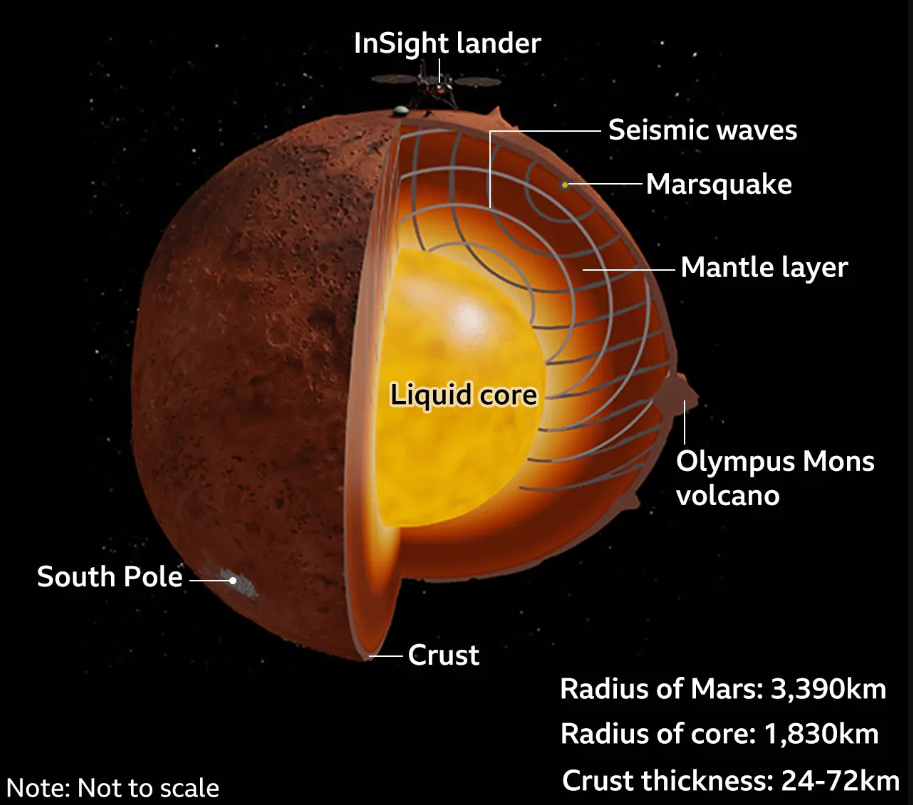Presence of Water on Mars | 23 Aug 2024
Why in News?
Recently, scientists have found frost atop Mars' tallest volcano, Olympus Mons, indicating the presence of a sparse but active water cycle on the Red Planet for the first time.
- In another development, a study suggested the existence of immense reserves of liquid water deep within Mars' rocky outer crust, marking the first discovery of liquid water on the planet.
What are the Recent Findings Related to Water on Mars?
- Water on Mars’ Volcano: For a few hours each morning during Mars' winter seasons, frost forms in the ancient calderas of the Tharsis volcanic region, which includes Olympus Mons. The patches of frost evaporate as sunlight shines down on the equator of Mars.
- The European Space Agency (ESA)’s Trace Gas Orbiter and Mars Express Orbiter discovered frost, which forms due to unique microclimates created by air circulation around mountain summits and through calderas.
Note:
- Olympus Mons is the tallest volcano on Mars with a height of 29.9 kilometres (around 2.5 times the height of Mount Everest). It is located close to the Martian equator, in Mars's western hemisphere.
- A caldera is formed when a volcano erupts and collapses inward, resulting in a depression on the surface.
- The Tharsis area is the largest volcanic region on Mars which hosts 12 large volcanoes.
- Water in Mars’ Crust:
- The study, titled 'Liquid Water in the Martian Mid-Crust' used the data from NASA’s Mars InSight Lander which was equipped with a seismometer which recorded seismic waves of Mars for four years.
- Mars Insight Lander was the first mission to study in depth the inner parts of Mars i.e., its crust, mantle, and core.
- The data collected by InSight Lander can be best explained if, deep below the surface of Mars, there lies a layer of fractured igneous rock, such as granite, whose cracks are filled with liquid water.
- The water likely infiltrated from the surface billions of years ago when Mars had rivers, lakes, and potentially oceans, indicating a warmer upper crust at the time.
- While the discovery does not confirm the existence of life on Mars, it suggests the possibility of a habitable environment, as water is essential for life.
- The study, titled 'Liquid Water in the Martian Mid-Crust' used the data from NASA’s Mars InSight Lander which was equipped with a seismometer which recorded seismic waves of Mars for four years.
Key Facts About Mars
- Mars is the fourth planet out from the Sun. It is also the second smallest planet in the Solar System after Mercury.
- It is called the "Red Planet" because iron minerals oxidise in the Martian atmosphere causing the surface to look red.
- Mars has two small moons, Phobos and Deimos.
| Important Missions to Mars | ||
| Mission Name (Year) | Space Agency/Country | Objective |
| Mariner 4 (1964) | NASA | First spacecraft to fly by Mars, and the first to provide images of the Red Planet. |
| Viking 1 and Viking 2 (both 1975) | NASA | First spacecraft to successfully land on Mars |
| Curiosity Rover (2011) | NASA | Studied Martian climate and geology; found evidence of past water on Mars. |
| Mangalyaan (Mars Orbiter Mission) (2013) | ISRO | First Indian mission to Mars; studied Martian surface features, morphology, atmosphere, and mineralogy. |
| InSight (2018) |
NASA |
Studied the interior of Mars, including its crust, mantle, and core, to understand the planet's geological activity |
| Tianwen 1 (2020) |
CNSA (China) |
To study Martian topography and geology and look for water-ice content. |
| Perseverance Rover (2020) |
NASA |
First mission to demonstrate gathering samples from Martian rocks and soil. |
| Hope Mars Mission (2020) |
United Arab Emirates |
Creating mankind’s first integrated model of the Mars’ atmosphere. |
UPSC Civil Services Examination, Previous Year Question (PYQ)
Prelims:
Q.Consider the following statements: (2016)
The Mangalyaan launched by ISRO
1. is also called the Mars Orbiter Mission
2. made India the second country to have a spacecraft orbit the Mars after USA
3. made India the only country to be successful in making its spacecraft orbit the Mars in its very first attempt.
Which of the statements given above is/are correct?
(a) 1 only
(b) 2 and 3 only
(c) 1 and 3 only
(d) 1, 2 and 3
Ans: (c)

